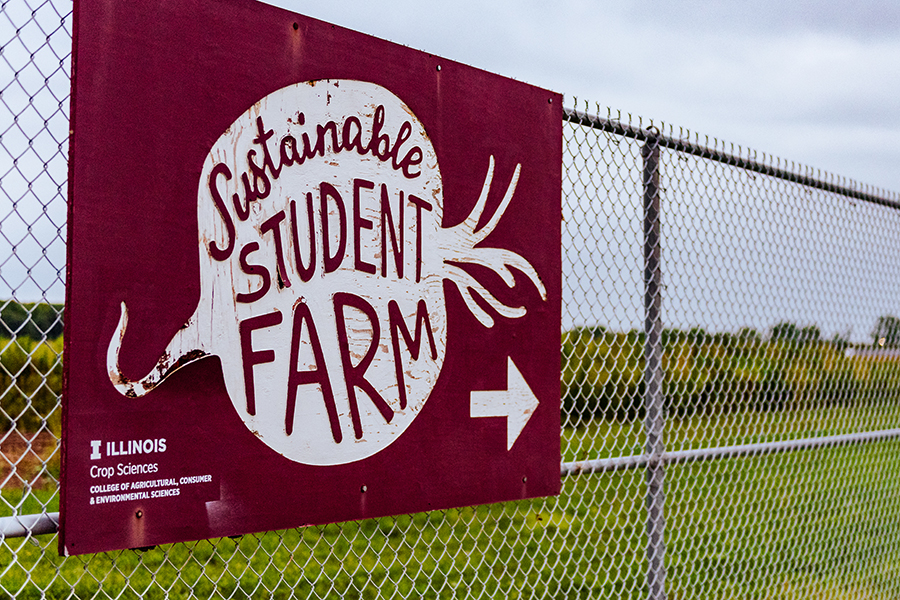Sustainable Student Farm offers fresh produce, educates students
The Sustainable Student Farm, located in Urbana, grows food for the University and the C-U community. The University’s dinning hall receives about 80% of the farm’s produce.
September 7, 2022
Since the Sustainable Student Farm opened in 2009, it has sourced produce for the University dining halls, the Food Science Department and local communities.
SSF also gives student workers first-hand farming, agricultural and marketing knowledge.
Matt Turino, manager of SSF, provided information about the farm.
“We are a five-acre educational vegetable farm on South Lincoln (Avenue) … just south of Windsor,” Turino said. “We are a space for students to come learn about sustainable agricultural practices as well as how to run a small-scale diversified vegetable production.”
Tori Lawlor, junior in ACES and part-time worker at SSF, said the farm grows a wide variety of crops, including tomatoes, kales, collards, swiss chard, peppers, beets, potatoes, carrots, basil, parsley and more.
Get The Daily Illini in your inbox!
Many students buy the farm’s produce from the SSF Farmstand, which opens every Thursday from 11 a.m. to 4 p.m. on the Main Quad.
According to Turino, the University dining halls receive around 80% of the farm’s produce. Turino noted that SSF also works with the Food Science Department on food processing. The department makes pizza sauce out of the farm’s tomatoes and hot sauce out of their hot peppers.
Aziz Evans, senior in ACES and part-time worker at SSF, explained that the farm developed other distribution methods over the summer.
“We had an online store open from Friday to Wednesday,” Evans said. “Whatever orders came in during that time, we harvested the stuff, bagged it up, and then (customers) would have a time window where they would like to come and pick up the produce.”
Evans said SSF also joined Community Supported Agriculture, a service where donors gave money to the farm and in turn received random produce every week.
Lawlor expressed that participating in all these distribution methods, particularly the SSF Farmstand, was very informative for her.
“It was very educational,” Lawlor said. “A lot goes into us getting there. We spend a lot of time the prior night harvesting and washing veggies, preparing them, weighing them out and making sure we have the correct amounts of everything we want to bring.”
The Sustainable Student Farm operates mainly through internships and part-time student workers. Lawlor and Evans both started out on the farm as summer interns. This was the case for Julia Curry, senior in FAA, as well.
“I’ve been really interested in environmental sustainability … so I thought this was a really cool opportunity to be super hands-on and do something about climate change,” Curry said.
Evans described a typical day working at the farm during the school year.
“I call the manager before I come in just to see what he needs done that day,” Evans said. “Typically, it’s been a lot of harvesting. And then, some other maintenance work like weeding. We also have some fall plantings.”
Turino said the student staff usually gets busy during the school year and cannot commit more than 10 hours of work per week. To address this issue, SSF developed a non-degree year-long apprenticeship program.
According to SSF’s website, the Illinois Small Farm Apprenticeship Program will begin in 2023 and span a year. The program will cost $6,000.
“The apprenticeship program will allow people to come in January and be a part of seed ordering, crop planning, designing the farm and figuring out what our marketing strategies are going to be,” Turino said. “They’re carried through the whole season of marketing and into the harvesting and managing of the farm. It’s plant maintenance and harvesting, washing, how to store the crops and how to grow about 40 different veggies and fruits.”
Turino also said that the apprentices will visit nearby farms, and SSF will bring in experts to give lectures on more in-depth topics, such as weed management and soil science.
Turino said he wants students to leave with confidence in their ability to grow and eat their own food.
The Sustainable Student Farm will hold an open house on Sept. 9 from 3 to 6 p.m. at 2711 S. Race St. in Urbana. There will be farm tours and food from the University dining services.
Curry said she learned a lot about the food growing process.
“I was super oblivious to how food is grown,” Curry said. “The way things are in America currently, there’s just a big disconnect between where food is grown and the consumers. It was so mind-blowing to see how things grow. I didn’t know asparagus just grew straight out of the ground.”







